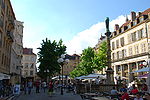Battle of Metz
Battles of World War II involving the United StatesHistory of MetzWestern European Campaign (1944–1945)

The Battle of Metz was a battle fought during World War II at the French city of Metz, then part of Nazi Germany, from late September 1944 through mid-December as part of the Lorraine Campaign between the U.S. Third Army commanded by Lieutenant General George Patton and the German Army commanded by General Otto von Knobelsdorff. Strong German resistance resulted in heavy casualties for both sides. The city was captured by U.S. forces and hostilities formally ceased on 22 November; the last of the forts defending Metz surrendered on 13 December.
Excerpt from the Wikipedia article Battle of Metz (License: CC BY-SA 3.0, Authors, Images).Battle of Metz
Rue du Chanoine Collin, Metz Bellecroix
Geographical coordinates (GPS) Address Nearby Places Show on map
Geographical coordinates (GPS)
| Latitude | Longitude |
|---|---|
| N 49.120277777778 ° | E 6.1777777777778 ° |
Address
Cité Administrative
Rue du Chanoine Collin 1
57014 Metz, Bellecroix
Grand Est, France
Open on Google Maps








